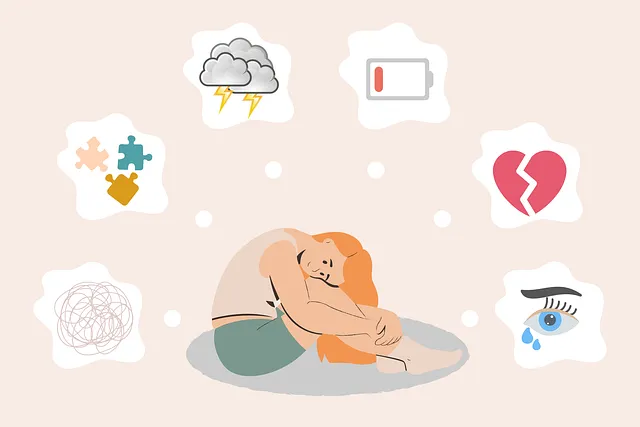In Castle Rock, trauma impacts individuals' mental and physical well-being, requiring specialized care. Kaiser offers a structured, holistic approach with tailored resources for stress management and emotional regulation. Understanding trauma manifestations and coping mechanisms is key, with empathy-building strategies like active listening vital. Residents can access comprehensive services through local community health centers or online platforms, integrating education, workshops, and awareness campaigns. This ensures mental well-being becomes an integral part of daily life, fostering healing and recovery through tailored care.
Trauma can profoundly affect individuals’ lives, shaping their mental and emotional well-being. Understanding its impact is crucial in navigating the path to healing. This article explores trauma support services provision, focusing on Castle Rock’s unique approach to mental health care and Kaiser’s role in offering specialized trauma assistance. We’ll guide you through the process of accessing these services, providing a step-by-step route for Kaiser members seeking help, especially in navigating the complexities of Castle Rock’s mental health landscape.
- Understanding Trauma and Its Impact
- Castle Rock: Navigating Mental Health Services
- Kaiser's Role in Providing Trauma Support
- Accessing Services: A Step-by-Step Guide for Kaiser Members
Understanding Trauma and Its Impact

Trauma is a complex response to distressing events that can profoundly impact an individual’s mental and physical well-being. It’s essential to recognize that trauma isn’t just about what happened; it’s also about how one processes and makes sense of those experiences. At Castle Rock, understanding trauma involves acknowledging its varied manifestations and the unique ways individuals cope. Many people affected by trauma struggle with anxiety, depression, flashbacks, nightmares, and difficulty regulating emotions—symptoms that can significantly impair daily functioning.
Empathy Building Strategies, such as active listening and non-judgmental support, are crucial in helping individuals feel heard and validated. Kaiser’s mental health services play a vital role in providing resources for stress management and emotional regulation techniques tailored to each person’s needs. Through therapy, support groups, and community outreach, these services foster an environment where individuals can safely process their trauma, develop coping strategies, and work towards healing. By understanding trauma and its impact, Castle Rock residents can access the necessary tools to navigate their journey toward mental health recovery.
Castle Rock: Navigating Mental Health Services

In Castle Rock, navigating mental health services through Kaiser offers a structured approach to well-being. The first step involves understanding the available resources, which include specialized clinics and a network of therapists. Kaiser’s comprehensive care model ensures individuals receive tailored support for their unique needs, whether dealing with anxiety, depression, or trauma. By utilizing these services, residents can build resilience and enhance their emotional intelligence, crucial aspects in managing mental health effectively.
For those seeking guidance, reaching out to local community health centers or online platforms provided by Kaiser is recommended. These channels facilitate the process of finding suitable therapists and programs. Whether it’s through counseling sessions or group support, Castle Rock residents can access evidence-based practices designed to boost confidence and prevent depression. This holistic approach ensures that mental well-being becomes an integral part of daily life.
Kaiser's Role in Providing Trauma Support

In Castle Rock, Kaiser plays a pivotal role in providing trauma support services that cater to diverse mental health needs. Through its comprehensive network, Kaiser offers accessible pathways for individuals seeking healing from traumatic experiences. One notable initiative is their Community Outreach Program Implementation, which bridges the gap between healthcare and community members by hosting educational sessions, workshops, and awareness campaigns focused on trauma recovery.
By integrating Burnout Prevention Strategies for Healthcare Providers into their practice, Kaiser ensures that its staff remains emotionally intelligent and resilient in assisting trauma survivors. This approach not only enhances patient outcomes but also fosters a supportive environment where emotional intelligence is prioritized. Kaiser’s commitment to these strategies enables healthcare providers to offer tailored care, recognizing the unique challenges faced by individuals navigating trauma and its aftermath.
Accessing Services: A Step-by-Step Guide for Kaiser Members

Accessing mental health services through Kaiser can be a crucial step toward healing and recovery, especially in areas like Castle Rock where specialized support is vital. Here’s a straightforward guide for Kaiser members to navigate this process:
1. Identify Your Needs: Recognize the signs of trauma or mental wellness challenges. This could include persistent feelings of anxiety, depression, flashbacks, or difficulties managing daily tasks. Understanding your specific needs will help you choose the most suitable support.
2. Connect with Your Primary Care Physician (PCP): Start by scheduling a consultation with your PCP. They can provide an initial assessment and discuss potential treatment options, including referral to mental health specialists within Kaiser. Your PCP can also offer guidance tailored to your situation, considering any co-occurring physical or psychological conditions.
3. Explore Kaiser’s Network: Kaiser offers a comprehensive network of mental health professionals and programs. You can access these services through online portals, where you might find therapist directories, appointment scheduling tools, and resources for various mental health concerns. Search for “mental health services” or “trauma support” within the patient portal to discover available options specific to Castle Rock.
4. Consider Specialised Services: Depending on your unique circumstances, explore specialized programs like trauma therapy groups, burnout prevention strategies for healthcare providers, or intensive outpatient care. Kaiser may have dedicated centers or partnerships with community-based organizations that cater to these specific needs.
5. Reach Out for Support: Don’t hesitate to contact Kaiser’s member services for assistance. They can provide clarification on coverage, help navigate the system, and ensure you receive the appropriate level of care. Remember, prioritizing your mental wellness is an important step towards a healthier and more fulfilling life.
Trauma support services are essential components of holistic mental healthcare, as demonstrated by the diverse initiatives discussed. For those in need within the Castle Rock area, understanding and accessing these resources, such as those offered by Kaiser, is crucial for healing and recovery. By following a straightforward step-by-step guide, individuals can navigate the process of obtaining mental health services through Kaiser, ensuring they receive the necessary care and support to overcome trauma and build resilience.




